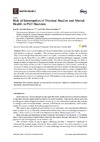Identificador persistente para citar o vincular este elemento:
https://accedacris.ulpgc.es/jspui/handle/10553/75133
| Campo DC | Valor | idioma |
|---|---|---|
| dc.contributor.author | González-Betancor, Sara M. | en_US |
| dc.contributor.author | Dorta-González, Pablo | en_US |
| dc.date.accessioned | 2020-10-30T09:34:13Z | - |
| dc.date.available | 2020-10-30T09:34:13Z | - |
| dc.date.issued | 2020 | en_US |
| dc.identifier.issn | 2227-7390 | en_US |
| dc.identifier.uri | https://accedacris.ulpgc.es/handle/10553/75133 | - |
| dc.description.abstract | PhD students report a higher prevalence of mental illness symptoms than highly educated individuals in the general population. This situation presents a serious problem for universities. Thus, the knowledge about this phenomenon is of great importance in decision-making. In this paper we use the Nature PhD survey 2019 and estimate several binomial logistic regression models to analyze the risk of interrupting doctoral studies. This risk is measured through the desire of change in either the supervisor or the area of expertise, or the wish of not pursue a PhD. Among the explanatory factors, we focus on the influence of anxiety/depression, discrimination, and bullying. As control variables we use demographic characteristics and others related with the doctoral program. Insufficient contact time with supervisors, and exceeding time spent studying crossing the 50-h week barrier, are risk factors of PhD studies interruption, but the most decisive risk factor is poor mental health. Universities should therefore foster an environment of well-being, which allows the development of autonomy and resilience of their PhD students or, when necessary, which fosters the development of conflict resolution skills. | en_US |
| dc.language | eng | en_US |
| dc.relation.ispartof | Mathematics | en_US |
| dc.source | Mathematics [2227-7390], vol. 8 (10),1695 | en_US |
| dc.subject | 32 Ciencias médicas | en_US |
| dc.subject.other | PhD students | en_US |
| dc.subject.other | Doctoral studies | en_US |
| dc.subject.other | Risk of interruption | en_US |
| dc.subject.other | Probability | en_US |
| dc.subject.other | Mental health | en_US |
| dc.subject.other | Anxiety | en_US |
| dc.subject.other | Depression | en_US |
| dc.subject.other | Discrimination | en_US |
| dc.subject.other | Bullying | en_US |
| dc.title | Risk of Interruption of Doctoral Studies and Mental Health in PhD Students | en_US |
| dc.identifier.doi | 10.3390/math8101695 | en_US |
| dc.relation.volume | 8 | en_US |
| dc.investigacion | Ciencias de la Salud | en_US |
| dc.type2 | Artículo | en_US |
| dc.utils.revision | Sí | en_US |
| dc.identifier.ulpgc | Sí | en_US |
| dc.description.sjr | 0,495 | |
| dc.description.jcr | 2,258 | |
| dc.description.sjrq | Q2 | |
| dc.description.jcrq | Q1 | |
| dc.description.scie | SCIE | |
| item.grantfulltext | open | - |
| item.fulltext | Con texto completo | - |
| crisitem.author.dept | GIR Análisis interdisciplinar de retos sociales | - |
| crisitem.author.dept | Departamento de Métodos Cuantitativos en Economía y Gestión | - |
| crisitem.author.dept | GIR TIDES- Técnicas estadísticas bayesianas y de decisión en la economía y empresa | - |
| crisitem.author.dept | IU de Turismo y Desarrollo Económico Sostenible | - |
| crisitem.author.dept | Departamento de Métodos Cuantitativos en Economía y Gestión | - |
| crisitem.author.orcid | 0000-0002-2209-1922 | - |
| crisitem.author.orcid | 0000-0003-0494-2903 | - |
| crisitem.author.parentorg | Departamento de Métodos Cuantitativos en Economía y Gestión | - |
| crisitem.author.parentorg | IU de Turismo y Desarrollo Económico Sostenible | - |
| crisitem.author.fullName | González Betancor, Sara María | - |
| crisitem.author.fullName | Dorta González, Pablo | - |
| Colección: | Artículos | |
Citas de WEB OF SCIENCETM
Citations
29
actualizado el 01-mar-2026
Visitas
173
actualizado el 12-oct-2024
Descargas
205
actualizado el 12-oct-2024
Google ScholarTM
Verifica
Altmetric
Comparte
Exporta metadatos
Los elementos en ULPGC accedaCRIS están protegidos por derechos de autor con todos los derechos reservados, a menos que se indique lo contrario.
